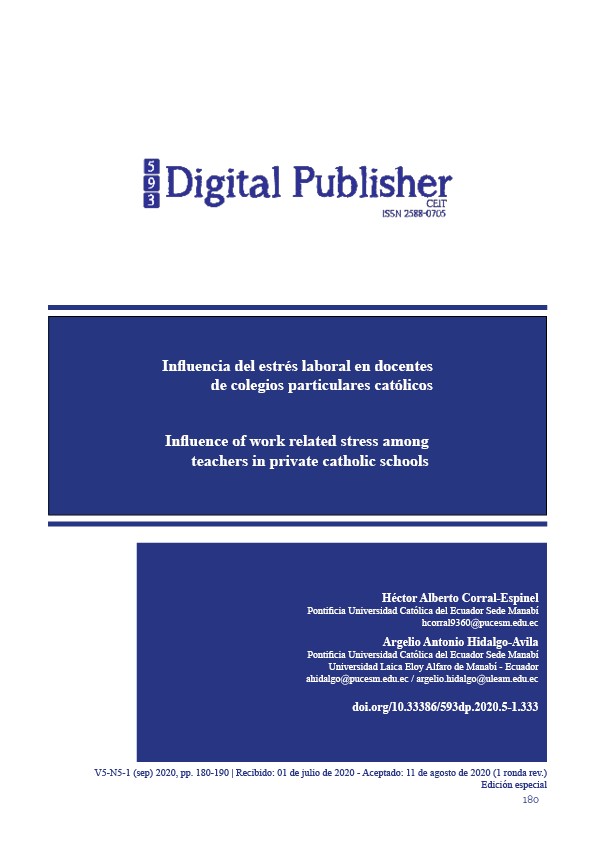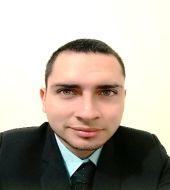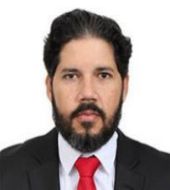Influence of work related Stress among teachers In Private Catholic Schools
Main Article Content
Abstract
Work stress is a psychosocial factor related to the individual and their workplace. This factor turns out to be very significant for those who study its effects on workers all over the world. The current research measures the impact of stress on teachers in private Catholic schools. The main goal of this study is to establish factors associated with Burnout syndrome (BOS). For this purpose, the Maslach Burnout Inventory - Educators Survey (MBI-ES) was applied to 102 teachers, considering sociodemographic variables such as: gender (male and female) and age (ranging from 20 to 71 years). Using a qualitative description model, very low Burnout results were observed in two out of three subscales: emotional exhaustion (16.67 percent), depersonalization (2.94 percent), and a high level of personal achievement (85,29 percent). In summary, there is a low influence of work related stress on teachers. Age and gender do not show relation to stress levels. It is worth mentioning, that each educational institution has a different organizational culture, being a distinctive and meaningful variable in each study. The information gathered in this investigation is expected to be of great importance in the development of further research.
Downloads
Article Details
1. Derechos de autor
Las obras que se publican en 593 Digital Publisher CEIT están sujetas a los siguientes términos:
1.1. 593 Digital Publisher CEIT, conserva los derechos patrimoniales (copyright) de las obras publicadas, favorece y permite la reutilización de las mismas bajo la licencia Licencia Creative Commons 4.0 de Reconocimiento-NoComercial-CompartirIgual 4.0, por lo cual se pueden copiar, usar, difundir, transmitir y exponer públicamente, siempre que:
1.1.a. Se cite la autoría y fuente original de su publicación (revista, editorial, URL).
1.1.b. No se usen para fines comerciales u onerosos.
1.1.c. Se mencione la existencia y especificaciones de esta licencia de uso.
References
Arís, N. (2009). El Síndrome de Burnout en los docentes. Education & Psychology I+D+i and Editorial EOS.
Brodsky. (1980). Burn-out: Stages od Disillusionment in the Professions, Human. Nueva York: Sciences Press.
Cornejo, C. (2015). Estudio del síndrome de Burnout en profesores de enseñanza media de colegios particulares, subvencionados y municipales de la provincia de Concepción. Obtenido de Universidad del Bío-Bío. Sistema de Bibliotecas - Chile: http://repobib.ubiobio.cl/jspui/bitstream/123456789/1043/1/Cornejo_Ochoa_Claudia.pdf
Cortés & Iglesias. (2004). Universidad Autónoma del Carmen. Obtenido de Generalidades sobre Metodología de la investigación: http://www.unacar.mx/contenido/gaceta/ediciones/metodologia_investigacion.pdf
Delgado, A. (2003). El síndrome de Burnout en profesores de educación secundaria de Lima Metropolitana. Revista de Investigación en Psicología, 26-47.
Díaz, F., López, A., & Varela, M. (2012). Factores asociados al síndrome de burnout en docentes de colegios de la ciudad de Cali, Colombia. Universitas Psychologica, 217-227.
Frutos, J., Gonzalez, P., Maíllo, A., Peña, J., & Riesco, M. (2007). Condiciones de trabajo y satisfacción laboral de los docentes en las escuelas católicas de Madrid. Educación y futuro, 9-42.
Gantiva, C., Jaimes, S., & Villa, M. (2010). Síndrome de Burnout y estrategias de afrontamiento en docentes de primaria y bachillerato. Psicología desde el Caribe, 36-50.
Gómez, C. (2009). El estrés laboral: una realidad actual. Summa Humanitatis.
Hellriegel y Slocum. (2009). Comportamiento Organizacional. México: Cengage.
Hernández, Terán, Navarrete y León. (2007). El síndrome de Burnout: una aproximación hacia su conceptualización, antecedentes, modelos explicativos y de medición.
Leka, Griffiths, & Cox. (2013). La organización del trabajo y el estrés. Serie protección de la salud de los trabajadores N° 3.
Maslach, C., Jackson, S., & Leiter, M. (1996). Maslach burnout inventory manual. Consulting Psychologists Press.
Maslash y Jackson. (1986). Inventory Manual.
Maya, E. (2014). Métodos y Técnicas de Investigación. En Una propuesta ágil para la presentación de trabajos científicos en las áreas de arquitectura, urbanismo y disciplinas afines. (pág. 9). México: Coyoacán.
Mediciones de estrés laboral en docentes de un colegio público regional Chileno. (2018). Información tecnólogica, 171-180.
Menghi, M., & Oros, L. (2014). Satisfacción laboral y Síndrome de Burnout en docentes de nivel primario. Revista de Psicología, 47-59.
Oramas, A., Almirall, P., & Fernández, I. (2007). Estrés Laboral y el Síndrome de Burnout en Docentes Venezolanos. Salud de los Trabajadores, 71-87.
Organización Mundial de la Salud. (2009). Global Health Risks. Mortality and burden of disease attributable to selected major risks.
Osorio, & Cárdenas. (2017). Estrés laboral: estudio de revisión. Diversitas: Perspectivas en Psicología, 8.
Pablo Gutiérrez, S. M. (2005). Estrés Docente: Elaboración de la escala ED-6 para su evaluación. Revista Electrónica de Investigación y Evaluación Educativa.
Quito, J., Tamayo, M., Buñay, D., & Neira, O. (2017). Estrés académico en estudiantes de bachillerato de unidades educativas particulares del Ecuador. Revista Electrónica de Psicología Iztacala.
Ratto, García, Silva, & González. (2015). El síndrome de quemarse por el trabajo y factores psicosociales en docentes de la primaria de la ciudad de Montevideo. Ciencias Psicológicas.
Rossi, D., & Gago, L. (2020). La diferencia del estrés docente en escuelas públicas y privadas del Gran Buenos Aires. Revista de educación, 49-64.
Saborío, L., & Hidalgo, L. (2015). Síndrome de Burnout. Medicina Legal de Costa Rica, 1-6.
Velázquez, R. S. (2014). Estrés y Burnout en docentes de educación media superior. Electrónica, Pag. 3.
Viniccia y Alvaran. (2004). El síndrome de Burnout en una muestra de auxiliares de enfermería: un estudio exploratorio. Universitas psicológicas, Pontificia Universidad Javeriana.
Zavala. (2008). Estrés y burnout docente: conceptos, causas y efectos.
Zuniga y Pizarro. (2018). Mediciones de Estrés Laboral en Docentes de un Colegio Público Regional Chileno. Scielo, 171-180.



